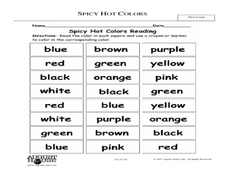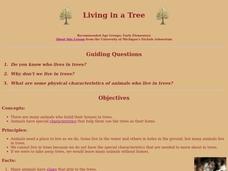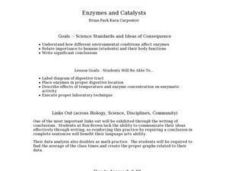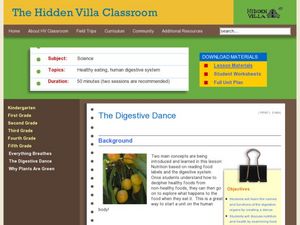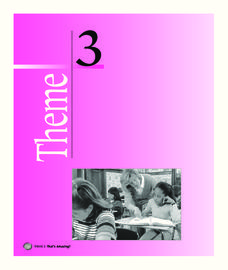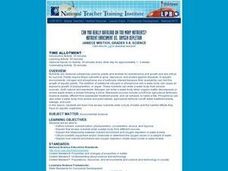Curated OER
Frogs
Students explore the external and internal structures of an amphibian and how frog anatomy compares to human anatomy. They collect pictures of a frog using a digital camera, create a web page, develop a PowerPoint presentation, and...
Curated OER
Spicy, Hot Colors
Students demonstrate an understanding of colors. In this visual arts lesson plan, students read the text Hot, Spicy Colors and name their favorite colors. Students complete a bar graph to show the data. Students discuss how each color...
Curated OER
The Wind & Sun: Powerful Alternatives
Students examine the power that is possible from the sun through an interactive program. They also analyze how energy turns into different forms in different parts of the human body. They finally explore how wind is created and how wind...
Curated OER
The Geophysics And Cultural Aspects of the Greater Antilles
Students determine location by using longitude and latitude. They measure to the minute longitude and latitude of a place and select a body of land and determine its location. They approximate time zones by using every 15 degrees of...
Curated OER
Biology Trivia Questions
Students answer 71 questions about a variety of topics in biology. In this biology trivia lesson plan, students use the internet to find the answer to questions about the systems of the body, their structures and functions, the different...
Curated OER
Living in a Tree
Students explore animals that live in trees. In this nature and biology lesson, students go outdoors and make observations about animals and their unique body parts that help them to live in trees. Students create drawings as they...
Curated OER
Graphing Toad/ Frog Respiration
Students measure respiratory rates on live toads, and the effect water temperature has on their findings. In this scientific method lesson, students record their findings and present them in a graph, comparing the results.
Curated OER
How Big is a Breath?
Students demonstrate how to use math skills to measure their lung capacity. In this human biology lesson, students use a clear plastic container, measuring cup and rubber balloons to demonstrate how the lungs work. Students estimate the...
Curated OER
Watersheds
Students discover the importance of watersheds and how they impact other bodies of water. Using a map, they identify and analyze a watershed in their local area and evaluate the health of the water nearby. In groups, they plan their...
Curated OER
Land Use and Nitrogen
Students consider the effects of development on water quality. They test nitrogen levels in waters before and after development, investigate wastewater treatment options and research best management practices to reduce nitrogen loads.
Curated OER
Enzymes and Catalysts
Students discuss the functioning of the digestive system and the specific enzymes present. They observe the action of amylase on starch to identify characteristics of enzymes then perform an experiment on the effects of temperature on...
Curated OER
The Heart Stopper
Use the pump from a spray bottle to drive a model of the heart in action! In addition to modeling the function of the heart and blood vessels, aspiring anatomists also simulate arterial blockage. They compare the effects of increased...
Curated OER
Animal Nutrition
A rather uninspired powerpoint which covers all the information that is required to recap nutrition needs and metabolism but does not include any images or infographics. Some of the information is unusual and specialised to farm...
Curated OER
Digestion Simulation
Learners study the human digestion system and the functions of the stomach and small intestines. In this digestion lesson students view a demonstration on the process.
Curated OER
The Digestive Dance
Students read food labels to compare healthy verses non healthy food and then use diagrams to create a poster of the digestive system. In this food lesson plan, students move the food down the digestive track along the digestive system.
Science Matters
Wave Watching
Seismologists use the direction and arrival times of p waves and s waves to determine the distance to the source of an earthquake. The engaging lesson has students line up to form human waves. Through different movements when attached,...
Royal BC Museum
Kids Page - Whales
Read about the physical features of whales and how they are grouped according to their method of eating food. A neat activity is described on the page; consider carrying this out in class. The resource makes a nice addition to a lesson...
NOAA
It's a Roughy Life
Scientists recently discovered several previously unknown species at the Bear Seamount off the coast of New England. Scholars research these new species — benthopelagic, benthic, and seamount fish — and find out what makes them...
Virginia Department of Education
Macromolecules
Finally, a chance for the class to play with their food! Allow pupils to simulate stomach acid with common foods, and introduce specific macromolecules into the mixture to explore characteristics of carbohydrates, lipids,...
Curated OER
Science Concept Maps
A collection of concept maps has some terms filled in and others left blank for young scientists to fill in. This library can provide you with many pop quizzes for all of your middle to high school science curriculum.
Virginia Department of Education
The Ratio of Surface Area to Volume
Demonstrate the ratio of surface area to volume in your high school class by using phenolphthalein, gelatin, and an onion. Intrigue the class by leading a discussion on osmosis and diffusion, then making "scientific jello." Participants...
Houghton Mifflin Harcourt
That’s Amazing!: English Language Development Lessons (Theme 3)
That's Amazing! is the theme of an English language development unit created by Houghton Mifflin. Following a speak, look, move, and listen routine, scholars delve into topics; seasons, weather, animals, landforms, telling...
Space Awareness
Meet Our Neighbors: Sun
The sun isn't just a ball of yellow! Young scientists learn about the features of the sun using a hands-on modeling activity. They build models of the sun using common household items to represent sunspots, solar prominence, and the...
Curated OER
Nutrient Enrichment vs. Oxygen Depletion
Learners investigate how excess nutrients enter a body of water, and the harmful effects they have on aquatic organisms.
Other popular searches
- Bodies of Water
- Landforms and Bodies of Water
- Major Bodies of Water
- Bodies of Water/rivers
- Bodies of Water Lesson
- Identifying Bodies of Water
- Different Bodies of Water
- Bodies of Water 101
- Bodies of Water Word Scramble
- Landforms and Water Bodies
- Earth's Bodies of Water
- Healthy Bodies Water

